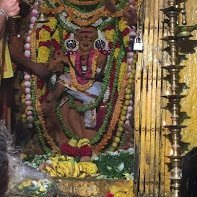1/ The importance of not giving up:
In Fiddler on the Roof, there is a scene where the lead looks up and talks to God.
I'd look up and say, "Am I really that stupid?"
And I seemed to hear a clear answer saying, "No, you're not stupid. You just have to keep at it."
So I did.
2/ On key price levels:
There are key price levels like
- previous day/week/month highs or lows
- round number levels
where you can have 1:5 or more worth RR of trades if you place yourself right.
The key is to hit the crest of the wave, just at the right moment.
If it doesn't work out, you have to get out.
Doing this, you can make several hundred points, risking 1/3rd to 1/5th of what you make.
3/ The secret to getting efficient at trading:
Cut down the number of trades you make.
The best trades are those in which all 3 things check out:
- Fundamentals
- Technicals
- Market Tone
Fundamentals - imbalance in supply/demand which could result in a major move.
Technicals - chart must show that the market is moving in the direction that the fundamentals suggest.
Market Tone - when news comes, market should act in a way that reflects the psychological tone.
Ex: A bull market should shrug off bearish news and respond vigorously to bullish news.
If you can restrict your activity to only those type of trades, you have to make money, in any market, under any circumstances.
4/ Importance of dynamic betting:
If you bet the same size when a trade meets all your criteria as with the trades that meet only one or two of your criteria,
you will remain an average trader.
When a trade is
- high probability
- fits all your criteria
you should bet larger than your regular trades that only fit one or two of your criteria for a trade.
5/ Why trend following is difficult now:
Nowadays, the moment the market breaks a key chart point, it is perceived by a whole universe of traders.
Now, you almost have to be contrary.
What do you mean by contrary?
You have to ask, "Isn't it true that all my fellow professional traders are already in? So, who is left to buy?"
The problem is that once you have defined a trend and takena position, everyone else has taken a position as well.
Since there's no one left to buy, the market swings around in the other direction and gets you out.
You didn't have to worry about this before, there was always somebody left to buy due to slow information reach.
Now, everybody is just as decisive and as fast.
6/ Identifying high probability trends:
There has to be a particular imbalance in the market that overrides everything else for a trend to be sustainable and give a decent trend movement.
Another exception is if we were to enter a major inflationary/deflationary environment.
7/ On surprise price moves:
If you see a surprise price move against you that you didn't understand, it's better to get out and look for the reason later.
8/ On handling limit moves in market:
Whenever there's a limit up or limit down situation for days in a row, it's better to become very very cautious after the third straight limit up/down day.
When volatility gets crazy under such limit movements, it's better to get out.
9/ On good times and bad times:
You have to hone your trading skills and craft when the markets and the times are very good.
By the time market gets difficult again, you should have the knowledge and skills to navigate through the difficult market phase.
So, keep learning.
10/ Getting caught in potentially intimidating disasters.
Whenever you're at the wrong end of a tail event, it's better to get out of your position first and think later.
What's bad can always get worse before it gets better.
11/ On trading success:
To be in the upper echelon of super-successful traders, requires an innate skill, a gift of sorts.
It's just like being a great violinist.
But to be a competent trader and make money is a skill you can learn.
12/ On Risk Management:
Always bet less than 5 percent of your money on any one idea.
Also be on the look out for correlation.
Correlated trades increase the risk with all else remaining the same which you don't want.
For ex: If you take a long position in two different related grain markets, that is still one idea.
If you're long Brent Crude and long WTI Crude, that's the same idea with additional risk.
So, be very cautious and wary of correlation among your trades.
13/ On Stops:
Always use stops.
Don't have mental stops.
Put them in the orderbook so that you commit to get out at a certain point.
Always pick where you will get out, before you get in.
14/ On being flexible:
If a position doesn't feel right as soon as you put it on, don't be embarrassed to change your mind and get right out.
If you become unsure about a position, and you don't know what to do, just get out.
You can always get back in.
When in doubt, always get out and get a good night's sleep.
Next day, things will appear much clearer and you can reevaluate your idea.
When you're in the trade, you can't think straight. You'll always be subjected to bias.
15/ Basic trading wisdom:
- Hold on to your winners
- Cut your losers
If you don't stay with your winners, you can't pay for your losers.
16/ On copying someone else:
If you try to trade someone else's idea or method, you're going to lose.
Every trader has their strengths and weaknesses.
As long as you stick to your own style, you get the good and bad in your approach.
But if you try to incorporate someone else's style, you often end up with the worst of both styles.
In the final analysis, you must have the courage to hold the position and take the risk.
If it comes down to "I am in this trade because Shyam is in it", then you're not going to have the courage to stick with it.
So, you're better off not be in that trade itself, in the first place.
17/ On Influence:
Be very conscious of the idea that you have to listen to yourself only.
Take information from others without getting overly influenced by their opinion.
If it is not your own idea, it messes up your trading.
It has to fit within your trading framework.
Always ask yourself, "How many people are left to act on this particular idea?".
You'll have to consider whether the market has already discounted your trade idea.
18/ On lead-lag trades:
When the news is wonderful, and the market can't go up, you want to be sure to be short.
Also, if you find a common behavior between markets/products, you want to sell the one that is lagging as soon as it starts heading down.
19/ On trusting/relying on experts:
Listening to experts can help only if you are listening to the right experts.
Most of these analysts or fintwit "experts" can't be a proper trader in a million years.
More money is lost listening to them.
So, do your own homework.
20/ Is market out to get you?
It's a foolish belief that there's conspiracy in the markets.
Market is bigger than anybody and sooner or later, it goes where it wants to go.
There are exceptions, but they don't last too long.
21/ On important traits to be a good trader:
Gut feel is very important.
All great professional traders have it.
Also, courage. Courage to try, to fail, to succeed, and to keep going when things get tough.
22/ On balancing life and trading:
If trading becomes all consuming, it is a torturous kind of excitement.
But, if you keep your life in balance, then it is fun.
All the successful traders sooner or later got to that point. They have a balanced life, and fun outside trading.
You can't sustain your trading life if you don't have some other focus.
Eventually you wind up overtrading or getting excessively disturbed about temporary failures.
23/ On revenge trading:
Fighting back by trading even heavier after you start losing NEVER works.
It's important to cut down very fast to the point of completely stopping if it gets bad.
Most of the time you'd be better off if you just stopped.
Never risk a blow-up.
The pattern will be: Lose, fight like hell, revenge trade, lose again, then cut back/stop, until you get on a winning track.
It's important to recognise this pattern before you get into the revenge trading mindset itself and stop yourself at the first step itself.
24/ On losing:
Losing begets losing.
When you start losing, it touches off the negative elements in your psychology.
It leads to pessimism.
So it's important to give yourself time before you get back on the right track, and scale down your size and frequency of trades.
25/ On the importance of position sizing and risk management:
Many people make money fast and lose it even faster because they are trading too big.
It's important to trade the right way, the right size, to sustainably grow as a trader.
26/ On stock trading:
There's bigger edge in stocks that aren't dominated by the professional traders.
Relative strength tells you what a stock has already done.
When there's high relative strength, the stock usually has exhausted itself.
27/ On trading bigger size:
As your capital size gets bigger and bigger, it becomes difficult to trade as you have to compete in fewer and fewer markets with higher liquidity.
So, it's important to scale the good habits and cut down the bad habits which will highly impact you.
28/ On acquiring trading skill:
If you can trade one market, you can trade almost all the markets.
The principles are the same.
Trading is emotion.
It is mass psychology, greed, and fear.
It's all the same in every situation, every market.
If you found this thread insightful, please go to the first tweet and retweet it so that many more people can benefit from reading this thread.
https://t.co/F2rYftdwo3
I write such weekly threads on the top one percentile traders and investors.
Follow me
@thebuoyantman to always be notified of my next thread.



